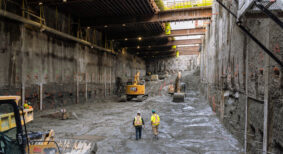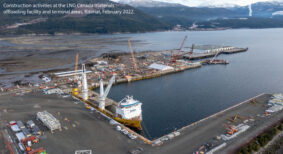The National Energy Board (NEB) has recommended approval of the Trans Mountain Pipeline Expansion Project, subject to 157 conditions.
The NEB has issued a 533-page report recommending Governor in Council approve the Trans Mountain Expansion Project.
The board’s recommendation report is one of the factors that Governor in Council will consider when making the final decision on whether or not the project should proceed.
The $6.8 billion Trans Mountain Expansion Project proposes to expand the existing Trans Mountain pipeline system between Edmonton, AB and Burnaby, B.C., increasing the capacity of the existing Trans Mountain Pipeline System from 300,000 barrels per day (bpd) to 890,000 bpd.
It would include approximately 987 km of new pipeline, new and modified facilities, such as pump stations and tanks, and the reactivation of 193 km of existing pipeline.
According to the NEB, almost 90 per cent of the pipeline route for the project parallels existing disturbance, which will reduce the need for new disturbance, and minimize the potential impacts of construction.
The 157 conditions set by the NEB include regulatory and/or overarching requirements as well as requirements pertaining to project engineering and safety; emergency preparedness and response; environmental protection; people, communities and lands; economics and financial responsibility; and, project-related marine shipping.
“Canada needs an expanded pipeline system that will generate thousands of family-supporting jobs, provide access to new, high-paying markets, and unlock billions of dollars in benefit to our country,” says ICBA President Philip Hochstein.
The expansion, as outlined in a report by the Conference Board of Canada, is expected to generate 802,000 person years of employment over more than 20 years and close to $50 billion in government revenues, which pay for vital public services. It will also generate more than $23 billion in additional local government taxes annually in B.C., which is more than double the current amount.
“Resource development is one of Canada’s time-tested creators of employment and wealth. For workers, this project will be an important platform for trade apprenticeship, employment and skill development, and provides a valuable opportunity to build a long, well-paid career in the construction industry,” says Hochstein.
The federal government’s final decision is expected on or before December 19, 2016, and will take into consideration the NEB recommendation report, consultations with Indigenous peoples, public input from the Ministerial Panel, and the comments received on the draft assessment of upstream greenhouse gas emissions.









